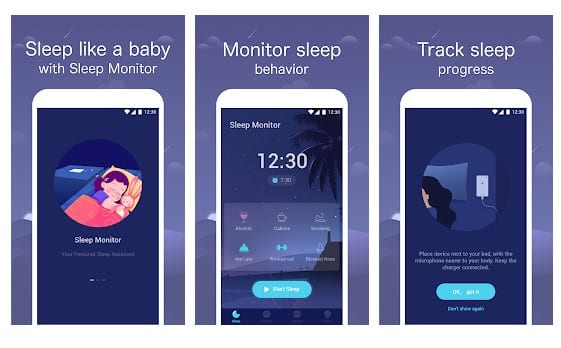
If you pair a sleep tracking app with a fitness tracker, a smartwatch, or any other wearable, it can use the accelerometer in your device to monitor your movements during sleep. While this approach isn’t the most accurate one, at least it allows sleepers to leave their phones on the nightstand instead of taking them to bed. If it notices you “fussing around”, it assumes you’re in a light sleep stage. Basically, when there’s minimal to no movement (or sounds), the app can assume that you are sound asleep. Most sleep trackers use your phone’s microphone to monitor how much you move during the night. Well, most sleep monitoring apps base their reports on the following tracking options : Now, when using the second type (sleep tracking apps), users often wonder:Īre they effective? How precise are those trackers and how do they work? But the number of truly good ones is a bit limited, unfortunately. Of course, there are also applications that combine all of the above : relaxing sounds, meditation, sleep journals, tracking, alarms, and more. Using the data they receive when tracking your sleep, such apps try to wake you up during the light stage, which makes it considerably easier to get up in the morning. Additionally, many of them include smart alarms (my favorite feature, to tell the truth).
#BEST SLEEP MONITOR APP HOW TO#
Such apps typically share helpful insights and pieces of advice on how to improve one’s sleep based on their findings.

The second group of sleep trackers can help users monitor their sleep. They play relaxing sounds, music, ASMR, or even literal white noise to help users block out any other disturbances (including loud neighbors or even your racing thoughts). The first group includes apps that work like white noise machines. Generally, all sleep-related applications can be divided into 2 large groups: pre-sleep relaxation and sleep tracking. Let’s start with the main types you can come across on the app market. But why are they so popular? And how exactly do they work? I mean, the number of available apps seems overwhelming sometimes. Seems like we are offered all the help we need to start sleeping better. The app will give you the next closest data, so to say. However, the truth is, you won’t get 100% accurate results. You can also try to pay more attention to your sleep and wake routines and see how the sleep app “catches” them.
To find a reliable option, you can look at other users’ reviews and see how satisfying their experience was.

Of course, most apps can’t guarantee extremely accurate results (for instance, your bedtime down to the minute), but many are as close as possible. Precision is key when it comes to sleep tracking. Consequently, you will have more chances to find effective solutions to your sleep-related issues. If you don’t make too much effort trying to interpret the data, you will be more likely to understand the nature of your sleep better. A good sleep app should be easy to “read”. Again, no one really needs overcomplicated graphs and statistics. So, it’s better to give your preference to those sleep apps that give you advice based on your data, send reminders to go to bed earlier, or share some helpful tips that might contribute to your sleep quality. It should give you certain guidelines and a direction for your future actions. What are you supposed to do with that information? A good sleep app has to put this data into context. I mean, let’s say you have found out that you’ve been getting less deep sleep. If a sleep app doesn’t share any pieces of advice concerning what you should do with the data, it’s pretty much useless. You can simply turn the Airplane mode on and enjoy your restful slumber.

However, if you are worried about sleeping next to your device, there is another trick to try. A quick note : many users also prefer sleep apps that allow sleepers to place their phone on the nightstand rather than on their bed. You probably don’t want an application that uses unnecessarily complicated settings, making you spend too much time every time trying to figure them out. Basically, you don’t want a sleep app that will require you to go through a hundred steps to track your sleep or set a smart alarm. What to Look for When Choosing the Best Sleep AppĪside from your personal preferences and sleep-related goals, there are certain factors that can be real deal-breakers when trying to pick the most suitable sleep app.


 0 kommentar(er)
0 kommentar(er)
